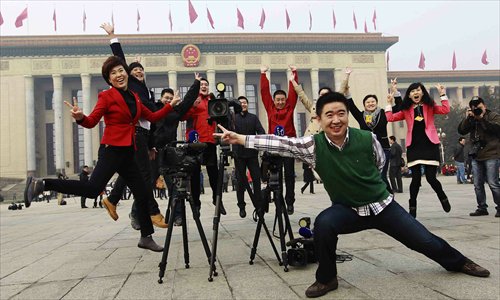HOME >> BUSINESS
China's captains of capital
Source:Global Times Published: 2013-3-17 23:18:02

Reporters pose for photos in front of the Great Hall of the People in Beijing after the closing meeting of the first session of the 12th National People's Congress Sunday. Photo: CFP
Editor's Note: With China's parliament voting on Saturday, important appointments were made in the fields of finance and economics. Zhou Xiaochuan was reappointed central bank governor, becoming the longest-serving chief of the central bank. Lou Jiwei, the former head of China Investment Corp, China's sovereign wealth fund, will now take over as Minister of Finance. Gao Hucheng, China's chief trade representative, will run the Ministry of Commerce. Xu Shaoshi, who formerly led the Ministry of Land and Resources, is the newly appointed head of the National Development and Reform Commission.
"The largest challenge facing these officials is how to improve the quality of China's economic growth and prevent overheated investment, inflation, housing price hikes and financial risks," Ha Jiming, vice-chairman of the investment management division of Goldman Sachs in China, was quoted by the Guangzhou Daily as saying Sunday.
Editor's Note: With China's parliament voting on Saturday, important appointments were made in the fields of finance and economics. Zhou Xiaochuan was reappointed central bank governor, becoming the longest-serving chief of the central bank. Lou Jiwei, the former head of China Investment Corp, China's sovereign wealth fund, will now take over as Minister of Finance. Gao Hucheng, China's chief trade representative, will run the Ministry of Commerce. Xu Shaoshi, who formerly led the Ministry of Land and Resources, is the newly appointed head of the National Development and Reform Commission.
"The largest challenge facing these officials is how to improve the quality of China's economic growth and prevent overheated investment, inflation, housing price hikes and financial risks," Ha Jiming, vice-chairman of the investment management division of Goldman Sachs in China, was quoted by the Guangzhou Daily as saying Sunday.
Zhou Xiaochuan: Monetary policy
Zhou's reappointment as governor of the central bank was widely anticipated following his election on March 11 as a vice-chairman of the Chinese People's Political Consultative Conference, which exempts him from compulsory retirement at 65.
Zhou, who took the helm of the People's Bank of China in 2002, is known to favor interest rate liberalization, an end to the yuan's pegging to the US dollar, and a push for the yuan to become a global currency.
He is expected to hurry market-based reforms of the interest rate and exchange rate regimes, which are needed to sustain long-term growth in the world's second largest economy and to ensure policy continuity.
In terms of monetary policy, Zhou said the central bank will take a cautious or neutral stance, in line with the government's 13 percent target for money supply growth, a relatively tight monetary policy in response to rising inflation. "The next step will be to focus on stabilizing prices," he said at a recent press conference.
Lou Jiwei: Fiscal policy
62-year-old Lou Jiwei is replacing Xie Xuren to take the helm of the Ministry of Finance, no surprise to the market as he has worked in the ministry for nine years, playing a major role in 1990s reforms of China's economic and tax systems.
With China's fiscal revenues slowing down, Lou's major challenges are strengthening budgetary management and reducing government administrative expenditures to ensure enough funds to cover social security and welfare.
Tax reform is regarded as a necessary breakthrough for deepening China's market reform. The key missions for the new finance minister will include the sharing and allocation of tax revenues between the central and local governments, the establishment of the property tax system nationwide, and the use of tax as a major tool of income distribution reform.
Gao Hucheng: Trade policy
Gao Hucheng, Vice-Minister of Commerce since 2003, was appointed Minister of Commerce, replacing Chen Deming. The transition comes at a time when China is facing increasing trade disputes with the US and the European Union, as well as weak external demand from its major trading partners.
Compared with the 10 percent trade growth target in 2012, the 2013 trade growth target is set on a par with the GDP growth rate, the ministry said in a press conference in January. The GDP growth rate is 7.5 percent for this year, according to the government's work report.
"China needs to emphasize balanced trade in the future, and meanwhile optimize its trade structure, export more value-added products and pay more attention to environmental protection," Zhuang Jian, China economist at the Asian Development Bank, told the Global Times Sunday.
Facing uncertainties among its traditional trading partners, the country is expected to shift its trade to Southeast Asia and Latin America, Zhuang said.
Xu Shaoshi: Economic planning
"I feel great responsibility and pressure as well," said 62-year-old Xu Shaoshi, the newly appointed head of the National Development and Reform Commission (NDRC) and former land and resources minister, as quoted by the Xinhua News Agency.
Xu is the third head of the NDRC, China's economic planner, since its establishment in 2003.
An overabundance of power and too much intervention in the market have caused many people to criticize the NDRC for causing price hikes rather than price cuts.
Xiao Gang: Securities market
55-year-old Xiao Gang, former chairperson of the Bank of China, was appointed to chair the China Securities Regulatory Commission (CSRC), taking over from Guo Shuqing, the official securities newspaper China Securities Journal reported Sunday citing an internal meeting of the CSRC.
Guo worked as chairman of the CSRC for one and a half years, and was known for a series of daring capital market reform measures such as fighting insider trading, delisting poorly performing companies, and weeding out bad IPO candidates.
Media have reported that Xiao will stay on course with existing policies.
Posted in: Economy